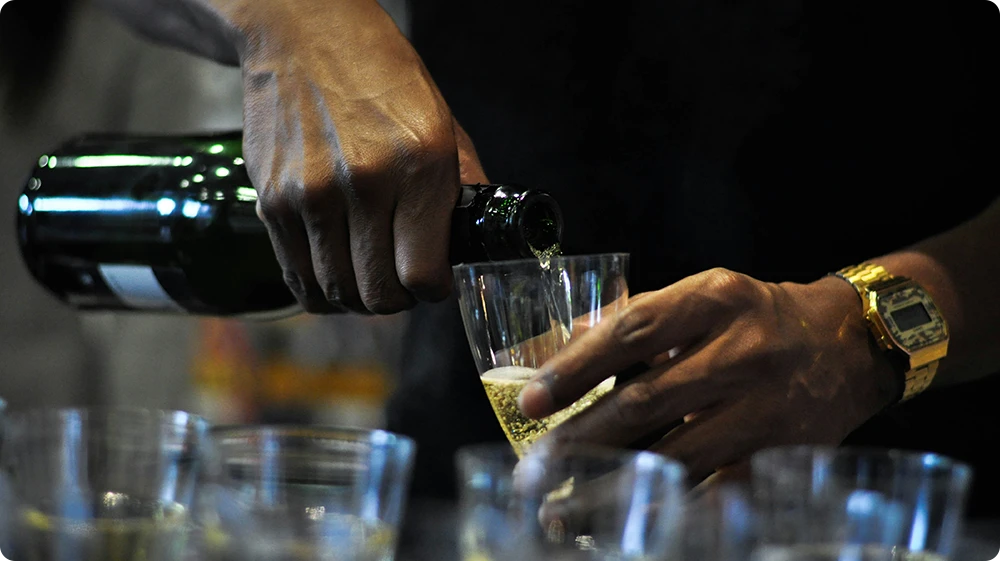Test purchasing is a method used by trading standards or licensing authorities to verify whether a business is complying with laws regarding the sale of age-restricted products, such as alcohol, to underage individuals.
This article explains everything you need to know about alcohol test purchasing, including who conducts them, when and why they’re done, what happens if you fail, and how your business can stay compliant.

What Is a Test Purchase?
A test purchase is when an underage person is sent into a licensed premises (such as a pub, shop, or restaurant) to try to buy alcohol. The goal is to verify whether the business is complying with the rules under the Licensing Act 2003 and other relevant laws.
Trading Standards or the police usually organise test purchasing operations. The young person involved is typically a trained volunteer who has been carefully briefed and prepared. During the test purchase, officials observe the sale and record how the business and its staff respond to it.
Test purchases are used to enforce compliance with specific offences under the Licensing Act 2003, particularly Section 146, which makes it a criminal offence to sell alcohol to someone under 18.
Want to learn more about alcohol laws in the UK? Click here for our guide to the Licensing Act
Who Conducts Test Purchases in the UK?
Test purchases are typically carried out by local Trading Standards officers, the police (often in partnership with Trading Standards), or licensing authorities. These bodies are authorised under legislation to carry out enforcement checks.
The individual attempting to make the purchase is always under the legal age, typically 16 or 17 years old. They are clearly instructed not to lie about their age, not to use fake identification, and not to mislead the seller in any way. These measures ensure the process is fair, legally defensible, and not considered entrapment.
Why Are Test Purchases Done?
The primary purpose of test purchasing is to ensure that businesses comply with the law, protect children from underage drinking, and encourage responsible alcohol sales.
These operations may be triggered by various factors, such as complaints from the public, previous failures in test purchases, random checks in areas considered high-risk, or reports of antisocial behaviour related to alcohol consumption.
Venues located in high-footfall or high-risk zones, such as near schools, clubs, or nightlife districts, are more likely to be targeted for these compliance checks.
How Does an Alcohol Test Purchase Work?
An alcohol test purchase typically begins with the recruitment of a volunteer, a young person under 18 selected and fully trained by the local authority.
During the operation, the volunteer is supervised by enforcement officers as they enter the venue and attempt to buy alcohol, usually without showing ID unless asked.
The officers observe or record the transaction, and if your staff proceed with the sale, the officers intervene and document the breach.
When Might a Test Purchase Happen?
You might not receive any warning before a test purchase, as these checks can happen randomly, in response to complaints, during busy periods such as weekends or festivals, or as part of a licence inspection.
How Will I Know If I’ve Failed a Test Purchase?
If your business fails a test purchase, you will usually be informed immediately after the sale, with officers explaining the nature of the breach. You may receive a formal warning, an improvement notice, or even a legal summons. In some cases, the local authority might conduct further visits or initiate a review of your premises licence.
What Happens If You Fail a Test Purchase?
Both the business owner and the staff member who sells alcohol to a minor can be held legally responsible. Staff may receive a fixed penalty notice, while business owners can face prosecution and significant fines if they fail to enforce proper procedures.
Additionally, the Designated Premises Supervisor (DPS), the person legally responsible for alcohol sales, may face action, including the suspension or revocation of their personal licence, particularly in cases of repeated or serious non-compliance.
Repeated breaches might lead to licence reviews, suspensions, or even closure orders.
Beyond the legal and financial repercussions, such failures can damage your business’s reputation and increase the likelihood of more frequent inspections.
First Offence Consequences
For a first offence, businesses often receive a warning or advice from Trading Standards. In some cases, mandatory staff training may be required to address compliance issues. A caution may also be issued, serving as a formal notice of the offence without immediate prosecution.
Repeat or Serious Offences
More serious or repeated offences bring stricter penalties. A business may receive a fixed penalty notice or face a formal review of its premises licence. Authorities may temporarily suspend the alcohol licence, and legal prosecution is possible, potentially resulting in fines or imprisonment depending on the severity of the breach. If a sale is made during a test purchase, the individual staff member involved may be issued a fixed penalty notice or criminal caution.
The Designated Premises Supervisor (DPS) holds legal responsibility for ensuring proper alcohol sales. Repeated failures can lead to the revocation of their personal licence. In severe cases, the entire business may face a licence review, temporary closure, or even permanent revocation of the premises licence.
Enforcement officers may also take further actions during or after a failed test purchase, such as interviewing staff under caution, requesting CCTV footage, or conducting a full inspection of the premises to assess overall compliance with licensing laws.
For more details, see our article on the Reasons Why Your Personal Licence Can Be Suspended.
Can You Defend Yourself If Accused?
Yes, you can defend yourself if accused of selling alcohol illegally. You have the right to request evidence, such as video recordings or official reports, and to provide your own supporting evidence, like training records and refusals log.
If your licence is at risk, you can also attend a hearing to present your case. Maintaining good documentation is crucial, as it can demonstrate that you took reasonable steps to prevent underage sales.
What Is the Purpose of Test Purchasing?
The purpose of test purchasing is to help enforce the Licensing Act 2003, reduce underage drinking, protect public health, and hold businesses accountable for their actions. The aim isn’t to penalise unnecessarily, but to promote responsible alcohol service and help ensure venues are complying with the law.
Best Practices to Pass a Test Purchase
To stay compliant, ensure all staff are trained on the Challenge 25 policy, with regular training sessions especially for bartenders. Maintain thorough records, including a refusals log and proof of staff training and DBS checks. Display Challenge 25 signage prominently near tills and entrances to remind both staff and customers of the policy.
Additionally, supervise staff during shifts and consider conducting internal mystery shopper exercises to assess compliance and identify areas for improvement. These exercises must only involve individuals aged 18 or over who appear younger. The use of minors is unlawful unless expressly authorised by Trading Standards or the police.
Enhance Your Team’s Compliance Skills
Ensure your staff are well-versed in age-restricted sales laws. Enrol them in Hurak’s accredited APLH Personal Licence Training Course to promote responsible alcohol sales.
Implement Challenge 25
First, implement the Challenge 25 policy by asking anyone who looks under 25 for valid identification, such as passports or driving licences.
Always request valid proof of age, rather than relying solely on appearance or verbal confirmation. This practice not only supports the Challenge 25 policy but also reinforces your due diligence defence in case of inadvertent sales to minors
Train Your Staff
Next, train your staff thoroughly so they understand the rules around age-restricted sales and feel confident refusing service when necessary. Staff should also learn how to spot fake or borrowed ID, and it’s important to keep written training records as proof of due diligence.
Implement ongoing training programs for your staff, focusing on age verification techniques, identifying counterfeit IDs, and managing refusal situations with confidence. Well-trained employees are your first line of defence against underage sales.
Keep a Refusals Log
Additionally, keep a detailed refusals log that records every instance where alcohol is refused, including the date, time, reason, and the name of the staff member involved.
For example: 01/05/2024 7:45 PM Male, approx. 16, no ID – Refused by Sarah J.
This log helps demonstrate that your staff are acting responsibly.
Stay Up to Date with Licensing Rules
Be aware of regional differences in licensing laws. For example, in Scotland, the Challenge 25 policy is a legal requirement, whereas in England and Wales, it’s a recommended best practice.
Ensure your business complies with the specific regulations applicable in your region.
Stay Informed with Expert Training
Licensing laws can vary by region. Hurak offers specialised courses, including the Scottish Personal Licence (SCPLH) Course, to keep you and your team informed and compliant.
Run Your Own Test Purchases
Some businesses opt to conduct their own internal test purchases as part of staff training, which helps identify areas needing improvement and better prepares employees for official compliance checks.
Use CCTV Monitoring
Finally, using CCTV monitoring at the point of sale ensures that footage is available to prove your staff followed proper procedures during sales.
Additional Support for Businesses
Local authorities and course providers often offer valuable support to businesses, including training on underage sales, workshops focused on responsible alcohol retailing, and advice sessions with licensing officers.
Stay informed by utilising resources provided by local authorities, such as advisory notes and training materials. Participating in workshops and displaying recommended signage can further showcase your commitment to responsible alcohol retailing.
Can Test Purchasing Happen at Events and Temporary Bars?
Test purchasing can occur at events and temporary bars, including pop-up bars, mobile bars operating under a mobile alcohol licence, and outdoor events with Temporary Event Notices. It’s important to ensure that all staff, including temporary hires, receive proper training to comply with the law and avoid any breaches during such events.
Plan Ahead for Your Events
Hosting an event with alcohol sales? Ensure compliance by applying for a Temporary Event Notice (TEN) and consider Hurak’s APLH course to train your staff effectively.
Your Rights as a Business
If you’re accused of selling alcohol to a minor, you have the right to ask to see the evidence against you. It’s essential to provide proof of your compliance efforts, including staff training records and a log of refusals. Additionally, be prepared to explain the steps you have taken to adhere to the requirements of the Licensing Act.
Secure Your Premises Licence with Ease
Secure Your Premises Licence with Confidence. Let Hurak assist you with their comprehensive Premises Licence Application Service, streamlining the process for you.
Understanding the Legal Framework for Test Purchasing
Test purchasing is a regulated enforcement tool carried out under clear legal authority. In the UK, Trading Standards and licensing authorities operate under the Licensing Act 2003, which allows them to monitor alcohol sales to ensure compliance with age restriction laws.
Test purchases are typically part of broader public health and safety strategies and must follow national guidance, including the Code of Practice for Age Restricted Products. These rules are in place to make sure businesses are treated fairly and that any testing is proportionate and transparent.
For example, officers must ensure:
- The young volunteer involved in the test looks their actual age and is not dressed to appear older.
- The test is not conducted in a misleading or deceptive way (e.g. encouraging the sale or pressuring staff).
- Proper records are maintained, and evidence is collected in an ethical manner.
Businesses can also benefit from the Primary Authority Scheme, a government-backed initiative that allows companies to receive consistent, tailored advice from one local authority, even if they operate across multiple areas. If you’re signed up to the scheme, enforcement action (like a test purchase) will usually involve consulting your primary authority first.
If you believe a test purchase was not conducted properly, or that you have a valid defence, you have the right to challenge the outcome or seek legal advice.
Understanding the rules behind the process helps you stay informed, protected, and confident in running a compliant business.
Conclusion
The goal of test purchasing isn’t to punish businesses, but to encourage compliance and protect young people, supporting businesses in meeting their legal responsibilities and ensuring the safe sale of alcohol.
Local authorities and businesses alike use test purchasing as a tool to educate, identify areas for improvement in procedures, and promote good practices, rather than punishing minor mistakes.
Keeping records, engaging with local authority guidance, and treating test purchasing as part of a responsible retailing culture helps protect both your business and the community.
FAQs
What is a test purchase in alcohol licensing?
A test purchase is when an underage person, supervised by authorities, attempts to buy alcohol to see if your staff are following the law. It’s used to check compliance with age restriction laws at licensed venues.
How will I know if my business has failed a test purchase?
In most cases, you’ll be informed immediately after the attempt. The officers involved typically notify you or your staff on the spot.
Who is responsible for authorising test purchases for alcohol sales?
Test purchases are authorised by local authorities, including Trading Standards, the police, or the local council’s licensing team.
What are the consequences if you fail an alcohol test purchase?
Failing a test purchase can lead to fines, warnings, or even a formal licence review. Both the business owner and the staff member who sold the alcohol may be held accountable.
How can I avoid failing a test purchase for alcohol sales?
You can reduce the risk by regularly training your staff, enforcing the Challenge 25 policy, maintaining a refusals log, and conducting internal compliance checks.
Can I conduct my own alcohol test purchases at my venue?
Yes, businesses can perform internal test purchases using individuals who are at least 18 years old but appear younger. It’s illegal to use actual minors for such tests unless authorized by Trading Standards or the police.
What is the role of the Designated Premises Supervisor (DPS) in test purchases?
The DPS is legally responsible for ensuring that alcohol sales comply with licensing laws. If a venue fails a test purchase, the DPS may face penalties, including fines or suspension of their personal licence.
How often can test purchases occur at my premises?
Test purchases can happen at any time, especially if there have been previous compliance issues or complaints. Authorities may conduct them randomly or as part of routine checks.
What steps should I take if I fail a test purchase?
If you fail a test purchase, review your staff training procedures, update your age verification policies, and consult with licensing authorities to implement corrective actions and prevent future failures.
Is it mandatory to implement the Challenge 25 policy?
While not legally required in all regions, implementing Challenge 25 is considered best practice. It involves asking anyone who appears under 25 for valid ID to verify they are over 18.
What types of ID are acceptable for age verification?
Acceptable forms of ID include a passport, UK photocard driving licence, or a PASS-accredited proof of age card. Always check the ID’s validity and photo to ensure authenticity.
Can test purchases be conducted at temporary events or pop-up bars?
Yes, test purchases can occur at any venue selling alcohol, including temporary events or pop-up bars. Ensure all staff are trained and aware of age verification procedures during such events.
What are the penalties for repeatedly failing test purchases?
Repeated failures can lead to severe consequences, including hefty fines, suspension or revocation of the premises licence, and potential legal action against the business and individuals involved.




